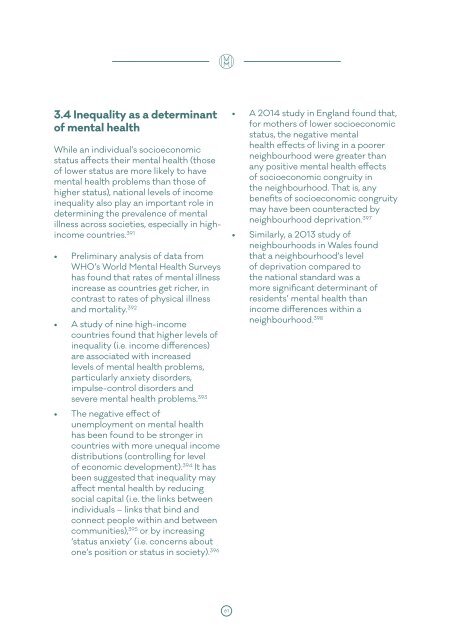FUNDAMENTAL FACTS ABOUT MENTAL HEALTH 2016
fundamental-facts-about-mental-health-2016
fundamental-facts-about-mental-health-2016
Create successful ePaper yourself
Turn your PDF publications into a flip-book with our unique Google optimized e-Paper software.
3.4 Inequality as a determinant<br />
of mental health<br />
• A 2014 study in England found that,<br />
for mothers of lower socioeconomic<br />
status, the negative mental<br />
health effects of living in a poorer<br />
While an individual’s socioeconomic<br />
neighbourhood were greater than<br />
status affects their mental health (those<br />
any positive mental health effects<br />
of lower status are more likely to have<br />
of socioeconomic congruity in<br />
mental health problems than those of<br />
the neighbourhood. That is, any<br />
higher status), national levels of income<br />
benefits of socioeconomic congruity<br />
inequality also play an important role in<br />
may have been counteracted by<br />
determining the prevalence of mental<br />
neighbourhood deprivation.<br />
illness across societies, especially in highincome<br />
countries. 391<br />
• Similarly, a 2013 study of<br />
397<br />
neighbourhoods in Wales found<br />
• Preliminary analysis of data from<br />
WHO’s World Mental Health Surveys<br />
has found that rates of mental illness<br />
increase as countries get richer, in<br />
contrast to rates of physical illness<br />
and mortality. 392<br />
that a neighbourhood’s level<br />
of deprivation compared to<br />
the national standard was a<br />
more significant determinant of<br />
residents’ mental health than<br />
income differences within a<br />
• A study of nine high-income<br />
countries found that higher levels of<br />
inequality (i.e. income differences)<br />
are associated with increased<br />
levels of mental health problems,<br />
particularly anxiety disorders,<br />
impulse-control disorders and<br />
severe mental health problems. 393<br />
neighbourhood. 398<br />
• The negative effect of<br />
unemployment on mental health<br />
has been found to be stronger in<br />
countries with more unequal income<br />
distributions (controlling for level<br />
of economic development). 394 It has<br />
been suggested that inequality may<br />
affect mental health by reducing<br />
social capital (i.e. the links between<br />
individuals – links that bind and<br />
connect people within and between<br />
communities), 395 or by increasing<br />
‘status anxiety’ (i.e. concerns about<br />
61


